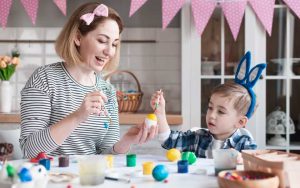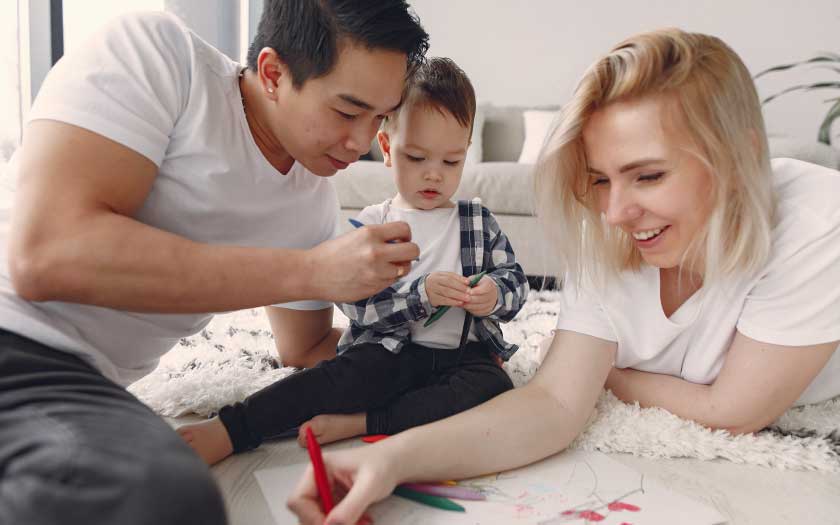What do kids need in terms of education these days? Early opportunities, we say. The earlier they start to learn and discover new things, the better! As we evolve with the times, we find that their educational needs are much different from our own when we were their age.
Some of us did not even have the chance to attend kindergarten, but we still turned out fine. Today, however, it is paramount that education and learning take place as early as possible so that by the time children enter school, they’re ready for the challenge that modern education brings.
The role of parents today is to ensure their children have enough early exposure and learning opportunities that will enrich their young minds without stripping them of a happy childhood.
That precious window of opportunity
Education has always been the most important part of growing up but back then, say even twenty years ago, things were way simpler. The rise in technology has taken education for kids to dizzying new heights. Parents know all too well that keeping ahead is much better than trying to catch up when it comes to education, for there is a tidal wave of relevant knowledge needed to thrive and succeed in life.
When we speak of childhood education, it’s good to keep in mind that it’s not just about kindergartens and preschools but there are also child enrichment programs that cover a variety of fields that can benefit your child.
Childhood is indeed a spectacular time of learning, playing, and growing. Children learn the fastest and easiest between the ages of birth and five years old, give or take. If there ever was a time to teach a child practically anything at all, it’s within this said time frame.
Early education advocators and experts have long agreed though, that it’s ultimately in the hands of parents to either take on the duty of teaching their kids at home or enroll them into centers, classes, etc. Either way, it’s a proactive approach towards enriching the growing mind of their young child that will help make full use of this time frame when learning is much easier.
Playschools and enrichment centers
Covering a plethora of subjects and skills, modern playschools and enrichment centers are specially designed by professional educators to help promote basic skills as well as higher-level thinking for children. In general, these establishments have one main focus, and that is to improve children’s ability to learn within their fun and interactive classes.
These early childhood education classes can be divided into two main categories; academic and extracurricular.
Academic Type Classes
Mathematics
Math classes for young children are structured in such a way to help them approach this subject in a fun and exciting way. You’ll always need to use maths in life, but being a maths whizz in these modern times can be a real boon! So, if you find a math class that your little one enjoys, count your blessing.
Science
Most children are curious by nature and a good science class will help to further encourage this curiosity that will eventually help them become better learners in school. Science classes or programs for little ones will offer them exposure to a variety of science fields suitable for young minds, where they will get to carry out hands-on ‘experiments’, make predictions, conclusions, and most importantly, have fun learning new things!
Reading and Writing
We are not likely to run out of the need to read and write, and sooner or later, kids will have to read and write to learn. Good foundations in these areas are crucial if they are to keep up with all the learning opportunities that are to come their way. Kids programs that focus on literacy, for example, help pave the path of further learning by instilling letter recognition, decoding, and grammar skills through educational and entertaining activities.
Children need to move their bodies
There are many aspects to a child’s development — and in the case of physical and cognitive development, each needs nurturing for a healthy balance in body and mind. Therefore, the focus should be given to both and not emphasise on one and neglect the other. Physical activities beyond learning motor skills, also provide sensory stimulation and encourage good habits and a positive attitude toward exercise. Children generally have lots of energy and play is a great way to expand it.
Little ones these days are in severe need of movement exercise too. owing to the era of internet, computers & electronic gadgets, emphasis on academic achievements, as well as the lack of social interaction. Besides limiting gadget time, parents should also include playtime in their schedule — simple things like stretching, skipping, hopping, even dancing within the house compound, or a brisk walk/run in the park that allow them to sweat it out goes a long way.
Good enrichment centers should combine learning and play in their curriculum. Lesson plans should be developed by qualified/certified experts in the business, while the play equipment/apparatus should be safe and purposefully designed to cater to the different development stages of the child’s growth.

Franchise & Marketing Manager,
Gymboree Play & Music
Extracurricular Type Classes
Music
Children will get a chance to explore different types of music and songs and they will even have the opportunity to make their own music. Who knows, your child might be a musical maestro in the making!

Think artistic rendezvous with crayons, water colours or colour pencils as well as all kinds of crafts projects. Your child will be able to try out various different mediums to create their own masterpieces. This is a great activity for children as it lets them have fun as they explore their artistic styles.
Cooking
Cooking is a skill no human should be without, for we all need food. Cooking classes for children are great ways for children to discover more about different types of foods and get acquainted with food preparation methods. They will be taught simple food prep such as mixing, mashing, and stirring. Don’t be surprised if your budding chef suddenly yearns to spend more time with you in the kitchen!
Speech
Language and speech affect the way your child interacts with others, and it will continue throughout their life. Children will be taught, in the chosen language of study, how to greet as well as carry on conversations with others as if it were second nature to them.
Dance
Children love to move their bodies, which is why dance classes for children are a hit! In dance classes, little ones learn to keep up with all the different tempos, control their body movements, and keep active at the same time. Dancing is also a fun way for children to develop their critical physical, psychological and physiological skills and you can also reap the benefits if you join a parent and child dance class which can help release stress and anxiety.
Choosing the Right Classes
With the abundance of enrichment programs available, you must choose the right one(s) for your child. Not all enrichment programs provide skills that will stay with a child throughout their lives. While these extra activities might be good for your child, you also have to be careful not to overwhelm them with too many as children too, can get stressed. As a guide, look for activities that allow children to use all of their senses and incorporate multiple learning styles.
Early learning centers FAQs:
What is the center’s actual schedule like?
Before signing up, take a good look at the program’s schedule of activities. Close inspection may reveal that there are far more downtime and unstructured free time than there is quality enrichment. There’s nothing wrong with indulging your son or daughter in one of these programs. Just know that there may be little or no lasting value for the child or the parents in this investment.
What kind of training and expertise does the staff possess?
Make it a point to learn about the background of the staff who will be teaching your child. Are they qualified teachers themselves or experts in a particular field? Also, inquire about the training they received.
Are there elements of fun?
A good enrichment program incorporates fun into the learning. When a child enjoys the learning process, the brain does a better job of assimilating and retaining the new information.
In what ways can a program enrich a child’s life?
When most people hear “enrichment,” they think of academic enrichment. When children can acquire new skills in such areas as creative writing, reading comprehension, problem-solving, and critical thinking, they benefit. If a program, however, also offers them growth in life skills areas that build their confidence, motivation, and self-esteem, as well as their communication and leadership skills, then you’ve found an enrichment program that can help a child grow in school and life.
The right food matters
Children are growing rapidly in the early years and require ample micronutrients (good carbohydrates, protein, omega 3, calcium, other minerals, and vitamins) to optimise growth potential and immune development. A well-designed menu can also improve the immediate learning aptitude and temperament of a child through improving attention span and mood management. A school can experience fewer accidents and better attendance due to the improved health of its students. What’s more, the early eating preference of a child sets the foundation for good diet habits, such as reinforcing preference for greens and fresh food while reducing the desire for processed or high sugar diet. Early preferences and habits formed in kindergarten can result in improved lifelong outcomes in health.
Some common snacks in Malaysian preschools do not provide good nutrition values for our fast-growing child, create sugar level volatility (mood swings, tantrums, and reduced impulse control) and diminish the ability to pay attention. In the longer run, such regular consumption of processed food can lead to higher risks of obesity and cancer.
The ideal food served to children in early education centers should include freshly cooked, balanced meals, complex carbohydrates, protein, and plenty of fresh vegetables.

Chief Education Officer,
Trinity Kids Malaysia
Preschool
Preschool refers to semi-formal educational classes specifically catered to three and four-year-olds. Although many parents believe preschool to be an unnecessary waste of funds, here is a list of why experts believe it is a strong pre-requisite to primary education.
There is evidence that children enrolled in preschool will not only learn numbers, shapes, and letters, they will be exposed to social skills like learning to share.
Statistics show that kids attending at least one year of pre-school have better pre-reading skills, richer vocabularies, and stronger basic math skills than those who do not.
Every child should have some sort of group experience before they begin kindergarten. Although swimming and art classes are great, preschool provides skills that less formal education cannot — for example, raising your hand if you want to answer a question.
Preschool provides a space where children can confidently do things on their own.
Toddlers will learn to tackle issues like making decisions. For example, they will discover to choose what they want to do or learn and even suggest class ideas.
Young children can learn about letters and numbers but forcing it down their throats is not the way. Keep in mind that preschool is all about having fun and achieving non-academic skills — they have the rest of their lives for that. The ideal early childhood curriculum should mainly involve singing, dancing, playing dress-up, physical play, and being read to.
Include your child’s opinion!
Yes… parents do know best, but it does not hurt to know how your child feels about attending playschool or an enrichment class. Many parents have made the mistake of assuming that since other little kids seem to be enjoying a certain class, their kids should too! Test run a few classes and gauge how your child responds to the experience on the whole. While a little shyness at first may ease up in time, a downright refusal to leave your site and join in any of the activities may be a sign that a certain class is not for junior! Trying to force your child to attend a class against his or her will only end up in dismay not only for your child but for the teachers as well!
Making the right choice
Early enrolment is important to help our little ones socialise, make friends, and build character. Early education centers which are play-based or ones that use the Montessori Method help children socialise, learn life skills, and learn grace and courtesy through playing and using materials provided. At this age, I believe all children learn best while they play — they learn to problem solve, to share and take turns, to socialise, to negotiate, to communicate. Through play, it helps build their gross motor skills and fine motor skills (which help prepare for writing in the future). A good centre will also observe the children and provide them tools & activities to ensure they reach appropriate milestones for their age and development. For children who struggle — it is critical that the centers conduct observations and make reports and get parent involvement as I believe that school and homes must work together for the best of the child. I also believe that every child is an individual and they are all different. They progress differently from one another and the key is to not stress them out if they have not yet mastered a skill their peers have already mastered. Just encourage them and practice with them more on that certain skill. Before settling on the ideal center, it’s always best to make appointments and go visit a few schools.
Have discussions and ask questions, ultimately if you feel peace in your heart then that’s where your child should go to.

Founder,
The Montessori Place


